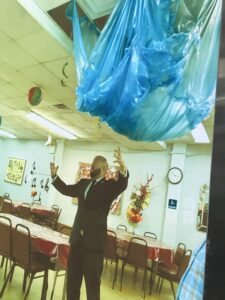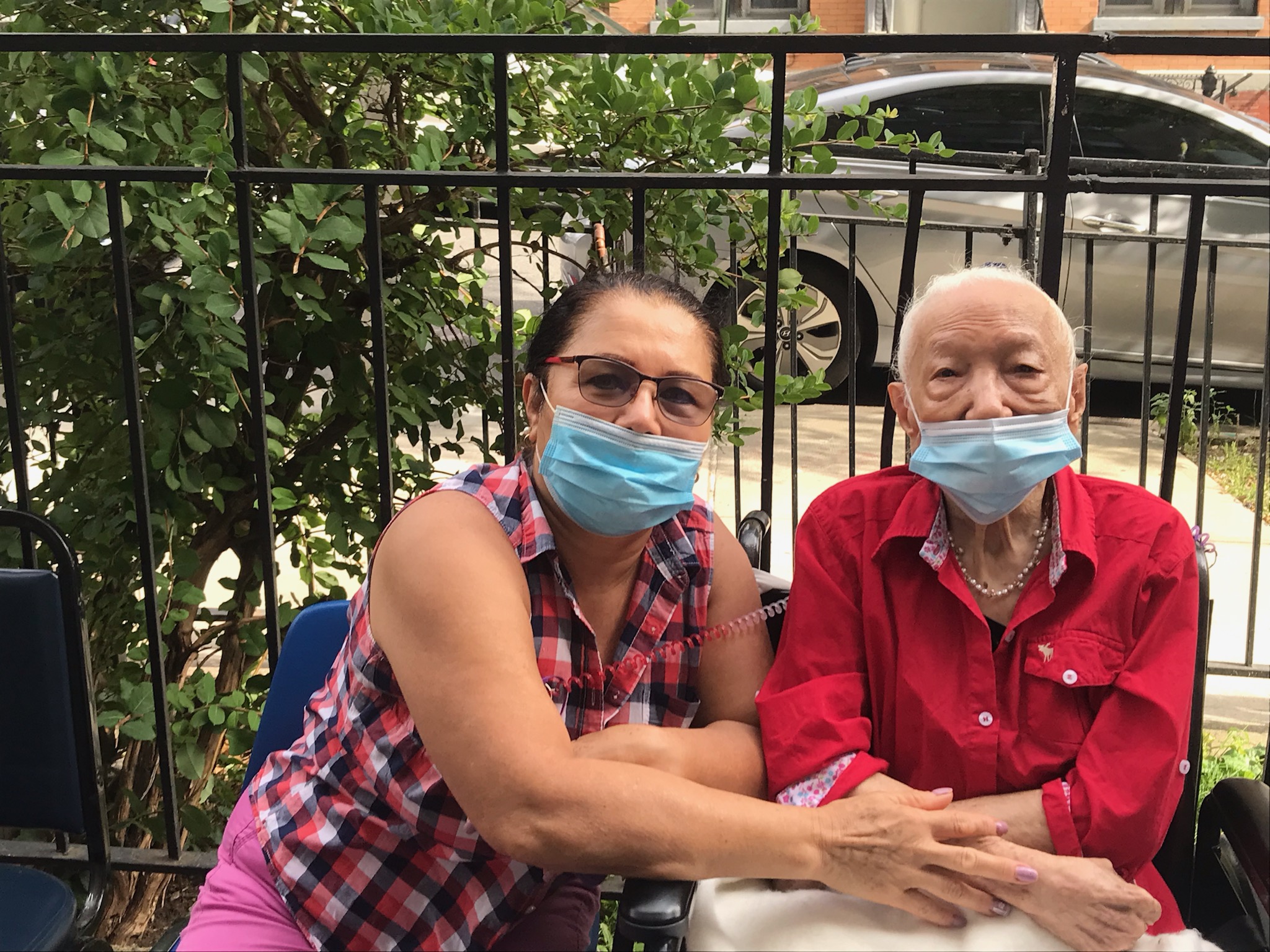Some 60-and-over residents in a Melrose public housing complex hoped the activity center on the ground floor of their complex would prove to be a respite from the hardships of the pandemic. But over recent months, hazardous conditions have forced them to lower those expectations considerably.
At a rally in front of the Melrose Mott Haven Senior Center on East 152nd Street, about 50 residents loudly applauded when City Councilman Rafael Salamanca Jr. and Rep. Ritchie Torres told them they’ll continue pressuring NYCHA into making urgently needed repairs so the senior center can reopen.
The center has been closed for months due to rotting ceiling tiles caused by rainwater and leaks from the building’s second floor, rendering the space unusable and exposing overhead wiring. Complicating matters, the center’s HVAC system has been shut down because it was overrun by vermin, causing the center to cancel cooling center services it had hoped to offer during summer heatwaves.
Miguel Orta, deputy director of social services at East Side Settlement House, says he called the complex’s superintendent in mid-April to fix the HVAC, but that the Housing Authority didn’t send a repair crew until June. By the time they returned to do the repair work in late July, it was too late to qualify the center as an official cooling center.
NYCHA’s services have “been going downhill for years,” said Orta. “Now it’s hit rock bottom.”
Elvira Seda, 77, has lived in the complex for 20 years.
“I used to sing karaoke in there,” said Seda, in Spanish. “Now there’s nowhere to go.”
Not only the public space has deteriorated dangerously. Aida Gonzalez, 85, said in Spanish that dirty water has been coming in through her sink on the second floor for years, damaging her floors and carpets. The work crew made holes in her walls to try to find the source of the leak. Two years later, not only was the source of the leak never found, but staff never returned to fill in the holes they’d made.
Although Gonzalez has complained to management, she said, “they don’t listen to me,”

Councilman Salamanca says he has been visiting the center monthly for years. A blown-up photo hung at the rally showed the two-term councilman standing inside the center with his arms raised toward full sized blue plastic trash bags dangling from the center’s ceiling to cover two missing ceiling tiles, as if praying for a miracle.
“NYCHA is aware,” said Salamanca. “We’re calling NYCHA out for their incompetence. NYCHA has turned their backs on the South Bronx.”
The councilman allocated $3.5 million for surveillance cameras four years ago, “and to this day, that money is sitting on their desk.” NYCHA officials have told him that that project will be finished in 2024. “Why do we need to wait until 2024 for the work to be done?”
“We need new leadership here in NYCHA,” Salamanca added. “The world needs to know how inefficient NYCHA is.”
Rep. Torres pointed out that a change in leadership at NYCHA would have to be decided at the federal level. Mayor Bill de Blasio’s current public housing tsar, Gregory Russ, has met with withering criticism for his attempts to implement a “blueprint for change,” that calls for private developers to invest in repairs and maintenance of certain NYCHA complexes, and in turn allows them some say in decision-making. Opponents counter that the policy amounts to a precursor for privatization of public housing, and would ultimately lead to the displacement of hundreds of thousands of public housing tenants citywide.
Rep. Torres, who grew up in public housing in the northern Bronx, said that seniors in his district “have been increasingly displaced,” and wants to see public housing make up a significant part of Pres. Joe Biden’s American Rescue Plan Act of 2021, which currently calls for $3.5 trillion to upgrade the nation’s teetering infrastructure.
“I will not vote for any infrastructure bill unless it includes billions for public housing,” he said, equating public housing with bridges and roads as an indispensable and overlooked part of the country’s infrastructure.
Angela Burgos, who leads exercise and excursion programs for the Melrose seniors, said that the residents are dependent on the meager programming they receive.
“These are people who live alone,” she said. “They need people to hug them; to tell them not to worry.”
Under the drumbeat of criticism, the Housing Authority has finally scheduled some asbestos remediation to begin this week. An organizer for the seniors passed out printouts listing other area NYCHA senior centers where the Melrose Houses tenants could go during the time the remediation. However, no one present at the rally had any idea how the seniors, most of whom use walkers or canes, will be able to get to the other centers.
In an email, the Housing Authority responded that “NYCHA thanks Congressman Torres and Council Member Salamanca for their continued commitment to NYCHA. This property requires a significant capital investment for a new roof and related repairs, and we look forward to discussing short and long term solutions with our elected and community partners.”

